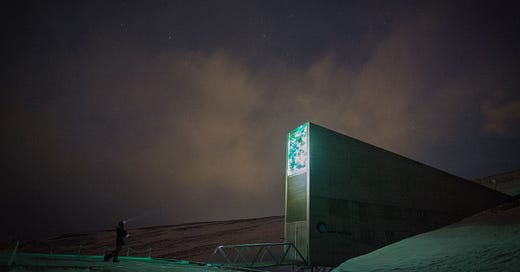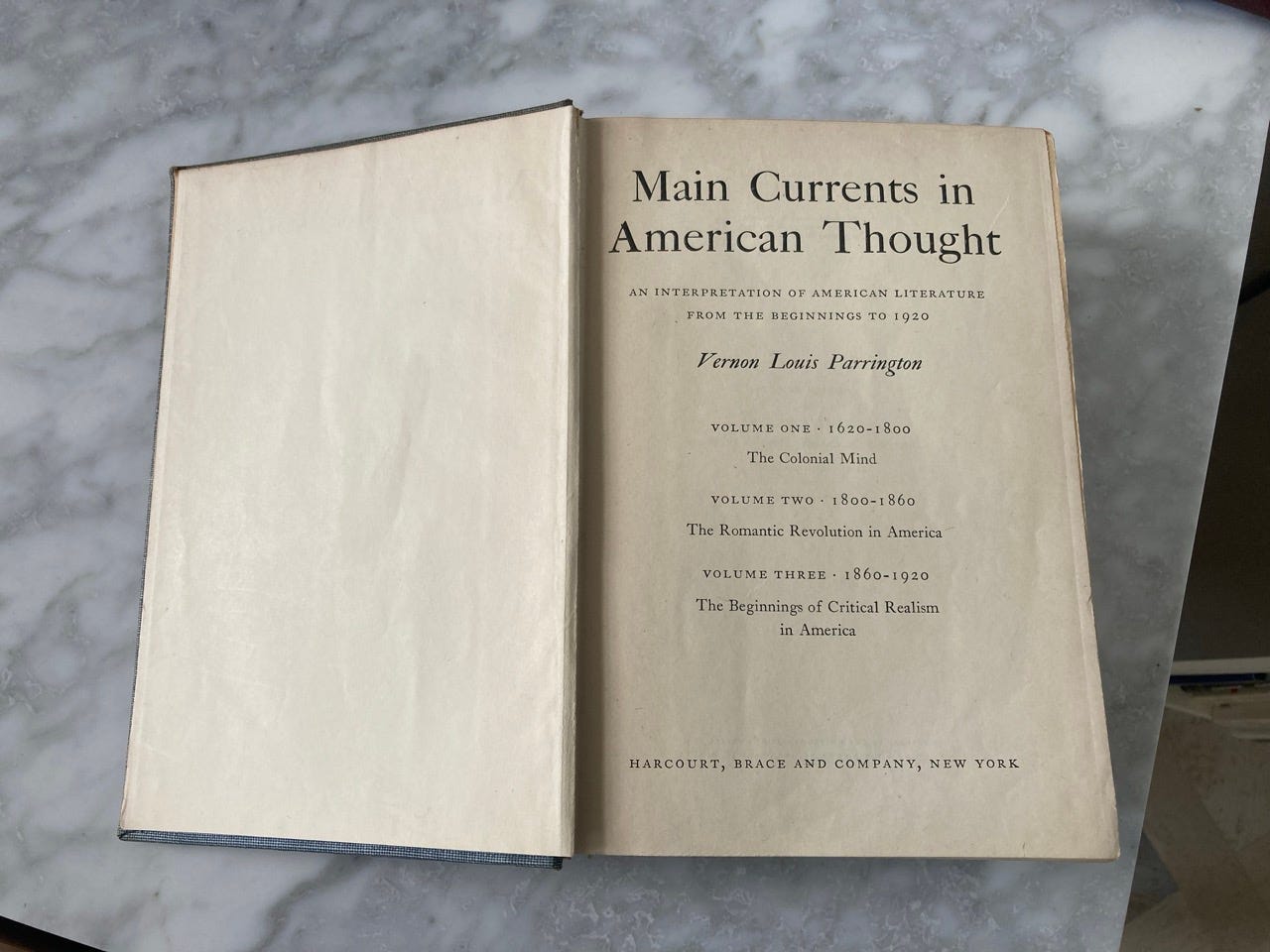Here are a few things I’ve been reading. Welcome to Pose Ponder’s new Monday feature: Findings. 🤓
Saving Seeds
An early victim of Russia’s invasion of Ukraine was the genetic riches of one of the traditional breadbaskets of humanity. In the first months of the conflict, Russian shells hit the Plant Genetic Resources Bank in Kharkiv. Founded in 01908, the gene bank preserved the seeds of 160,000 varieties of crops and plant seeds from around the world, and was the repository for many unique cultivars of Ukrainian barley, peas, and wheat. Tens of thousands of samples, some of them centuries old, were reduced to ash.
At a conference in Switzerland in 2022 I met a lady working to preserve the dying olive trees of Puglia mentioned in the article. She brought samples of Puglian olive oils to taste and explained her research on the bacterium causing the die-out.
Check out the Svalbard seed vault.
Historical Parrington
Parrington, Vernon Louis (1871-1929) - HistoryLink.org
One of the first major Progressive historians writing in the early 20th century, Parrington is accused of being a critic of the Federalists and the Constitution (so say the Hillsdale folks), along with Charles Beard and J. Allen Smith.
This article, taken from a speech given in 1986 by a Seattle local (Junius Rochester), charmingly depicts Parrington the person.
Vernon Louis Parrington arrived in Seattle in 1908 at the age of 37. He had visited our verdant city earlier, in 1901, to marry his Oklahoma sweetheart, Julia Williams. Julia was at the time visiting close friends in Seattle, Judge & Mrs. G. A. C. Rochester -- my grandparents.
I recently acquired a one-volume edition of Parrington’s Pulitzer Prize winning history. Here’s the title page. And see my quasi-review of Bradley Watson’s history of the historians.
Right to Repair
The Right to Repair - DailyChatter
The EU passed new regulations ensuring consumers have a right to repair old products. Manufacturers have notoriously fought the legislation, said to be essential for reducing waste and moving to a circular economy. When I shared this article with family, my daughter called the development: “Huge. HUGE.”
I do wonder how a widespread shift to product longevity will change the economy overall, especially given our dependence on quickly evolving technology.
Parsing Polanyi
Karl Polanyi's failed revolution - UnHerd
I slogged my way through Karl Polanyi’s Great Transformation book a year or so ago. It’s a hard read requiring a lot of background I do not possess, but the ideas are of first-rate importance for understanding the shift from pre-capitalist to capitalist economies, including the commodification of labor and land. This is the first explanation I’ve run across that explains in comprehensible terms much of what I got out of the book.
Highly recommended, if you’re into nuanced critiques of capitalism and markets.
Few 20th-century thinkers have had such a lasting and profound influence as Karl Polanyi. “Some books refuse to go away — they get shot out of the water but surface again and remain afloat,” Charles Kindleberger, the economic historian, remarked about his masterpiece The Great Transformation. This remains truer than ever, 60 years since Polanyi’s death, and 80 since the book’s publication. As societies continue to wrestle the bounds of capitalism, the book arguably remains the sharpest critique of market liberalism ever written.
Economics is an essential philosophical science in the Anthropocene. It’s theory. It’s data. It’s philosophy.
Chevron & the Admin State
Congress should get ready for a post-Chevron America | The Hill
The key argument against administrative overreach, in my opinion, is that the officials in question are non-elected, and thus not responsible to the American people. It’s one thing to have a civil service, where non-partisan jobs aren’t at risk every time an administration changes. It’s quite something else to bypass the legislature to “get the job done.” There’s also the question of what kinds of issues courts should be overseeing.
For much of the 20th century, conservatives have criticized the administrative state. At bottom, they are troubled that executive agencies can issue regulations that go beyond the plain text of statute.
A president is supposed to “take care that the laws be faithfully executed,” according to the U.S. Constitution’s Article II. Yet, president after president has succumbed to the temptation to avert dealing with Congress by issuing regulations far beyond the scope of a law. Often, an aggrieved private party will file suit, and the federal courts are left to decide if a president has gone too far.
I’m keeping an eye on the Chevron case. First, it’s part of my intention to pay more attention to what’s happening at the Supreme Court. Second, it’s a foundational case in the experts-elites “deep state” administration wars. Third, the article is written by
, a keen observer and analyst of congressional (dys)function, whose work I admire. You can read more about the case and argument at the ScotusBlog.Protesting Sardines?
Scholar Gabriele Parrino, who was a visiting a scholar at the Hannah Arendt Center this spring, wrote about an "unprecedented event" which occurred in the Italian city of Bologna in November 2019. "Against the discriminatory policies of former Interior Minister Matteo Salvini," he writes, "four very different people, represented by Mattia Santori, began to sing in Piazza Maggiore. Within a few hours, this single chant became a call that grew into a crowd of six thousand people. In a couple of days, the new phenomenon of the 6000Sardines spread throughout the country. Journalists across Italy described it as a 'joyful,' 'hopeful,' and communal event 'moved by feelings of humanity.'"
There’s a long excerpt from the original article at the HAC blog, with a link to the full piece. It’s inspiring as an instance of “people power.”
Maybe it offers an instructive contrast to current student demonstrations? On that matter, I think the media is over-playing student protests relative to actual events on the ground. In any case, Paul Alivasatos, president of the University of Chicago, shows the way forward in his statement on Chicago’s commonsense principles for dealing with the protests. All praise to my alma mater.






I mean singing and dancing in the streets is great, but the hippies did that and look what happened there. Nixon crushed them with the drug laws and Vietnam.